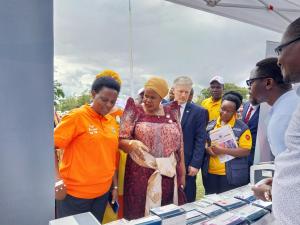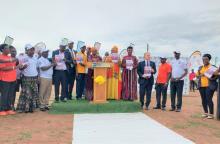Uganda Government reiterates commitment to end TB by 2030
Uganda joined the rest of the world to commemorate International Tuberculosis (TB) Day, on March 24, 2023, with a commitment from Government and stakeholders to step up efforts to end the TB epidemic by 2030.
The national commemoration was held at Boma Grounds, Butaleja district in Eastern Uganda under the theme, “Yes! We Can End TB” and the slogan, “What are you doing to end TB?”
“This day provides an opportunity for self-reflection and acceleration of our efforts to end the TB epidemic. Ending TB by 2030 is a priority for the government of Uganda. Office of the Prime Minister (OPM) is ready to steer all stakeholders towards the realization of the country’s ambition and international commitments,” said Hon. Lukia Isanga Nakadama, the Third Deputy Prime Minister who was the guest of honor at the function.
Hon. Nakadama observed that TB-affected households experience out-of-pocket expenditure of up to 53% of their income. She, therefore, suggested targeting affected households for government poverty reduction programs such as the Parish Development Model.
During the 5th Annual TB and Leprosy Stakeholders Conference held in December 2022, Prime Minister Hon. Robinah Nabbanja launched the ‘Live TB Free campaign’ to raise public awareness about TB prevention and management in Uganda.
The campaign is a response to a situation in which approximately 91,000 people contract TB every year, translating to about 240 people daily. Two out of every 100 people with TB have drug-resistant TB (that is not cured by first-line drugs), and approximately 30 people die from TB every day. More than half of TB-related deaths are among people living with HIV while about 15% of TB patients in Uganda are children aged below 14 years.
The Government of Uganda recommends early case detection and treatment as a key strategy to control TB disease. Consequently, the Ministry of Health (MOH), in collaboration with partners implements priority interventions at health facilities and communities, to improve TB screening, case detection, and treatment.
“Lives of over 500,000 Ugandans have been saved with effective TB treatment since 2015. Through several collaborative actions, we have realized improvement in the treatment success rate from 72% in 2015 to 88% in 2022. TB treatment is available free of charge to all people with TB in Uganda. TB preventive therapy is also freely available for people leaving with HIV and the contacts of confirmed TB patients. Accountability for each TB patient started on treatment will continue at facility and district level for further improvement in treatment success,” said Hon. Anifa Kawooya Bangirana, Minister of State for Health in charge of general duties.
During the 2018 United Nations (UN) General Assembly high-level meeting on TB, countries committed to pursuing multisectoral engagement and accountability at global, regional, national, and local levels to end TB. They also pledged to ensure the timely implementation of a Multisectoral Accountability Framework for TB (MAF-TB) in collaboration with partners, civil society, and affected communities. In September this year, during the UN General Assembly, countries will review progress on the 2018 commitments on the TB fight.
At the Ministry of Health, the National TB and Leprosy Programme has adopted WHO-recommended guidelines and innovative approaches to the detection, diagnosis, treatment, and prevention of TB. This led to the launch of the National MAF-TB Guidelines in 2020.
WHO is supporting ministries, departments, and agencies (MDAs) to integrate TB into workplace policies to minimize stigma and discrimination against people affected by TB. With support from MDAs, about 18,000 people were screened from their workplaces in 2022, with about 340 positively diagnosed with TB and started on treatment. In 2021, TB case detection improved from 77% to 82% of estimated TB cases with the treatment success rate improving from 72% to 88% of the targeted cases.
“I am aware of the immense investment from bilateral and multilateral donors to Uganda’s health sector. Some of these funds have been channeled through WHO, for which we are grateful. Without such funding and the presence of dedicated human resources, we would have lost many more lives,” said Dr. Yonas Tegegn Woldemariam, WHO Representative in Uganda.
“I call upon each of us, present here today, to play a role in preventing and managing TB infections. The task may appear challenging, but we can scale up efforts to address this growing threat. We must embrace a multisectoral approach by complimenting each other’s efforts in the fight”, he added.
According to WHO, early detection of TB saves more lives because the disease is treatable and curable. The duration of treatment for susceptible (uncomplicated form of TB) is between four to six months while the treatment for Drug Resistance TB (DR-TB) lasts between 9-12 months.
“I thank the government and implementing partners for introducing enablers at the health facilities. At the health facility, patients are given transport refund and food rations such as beans, cooking oil, and sugar,” said Fred Ebil, a TB survivor who spent two years on treatment for multi-drug resistant TB.
Communications Associate
WHO Uganda Country Office
Email: afwcougcom [at] who.int (afwcougcom[at]who[dot]int)
Phone: +256740487734
Communications Officer
WHO Uganda
Email: tcheutchouae [at] who.int (tcheutchouae[at]who[dot]int)




